模块1 Unit 1 School life 说课课件
文档属性
| 名称 | 模块1 Unit 1 School life 说课课件 | 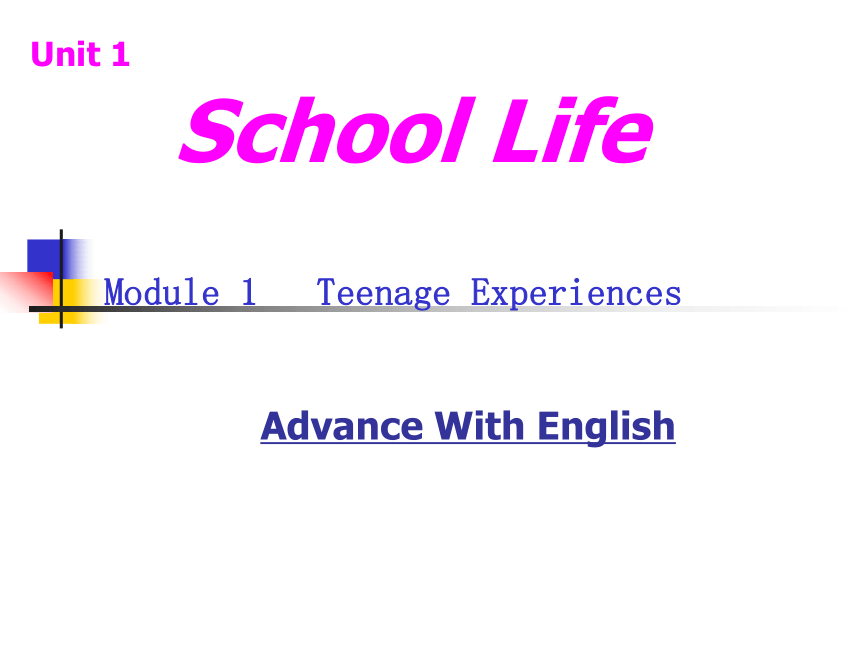 | |
| 格式 | rar | ||
| 文件大小 | 1.2MB | ||
| 资源类型 | 教案 | ||
| 版本资源 | 牛津译林版 | ||
| 科目 | 英语 | ||
| 更新时间 | 2008-08-26 15:13:00 | ||
图片预览

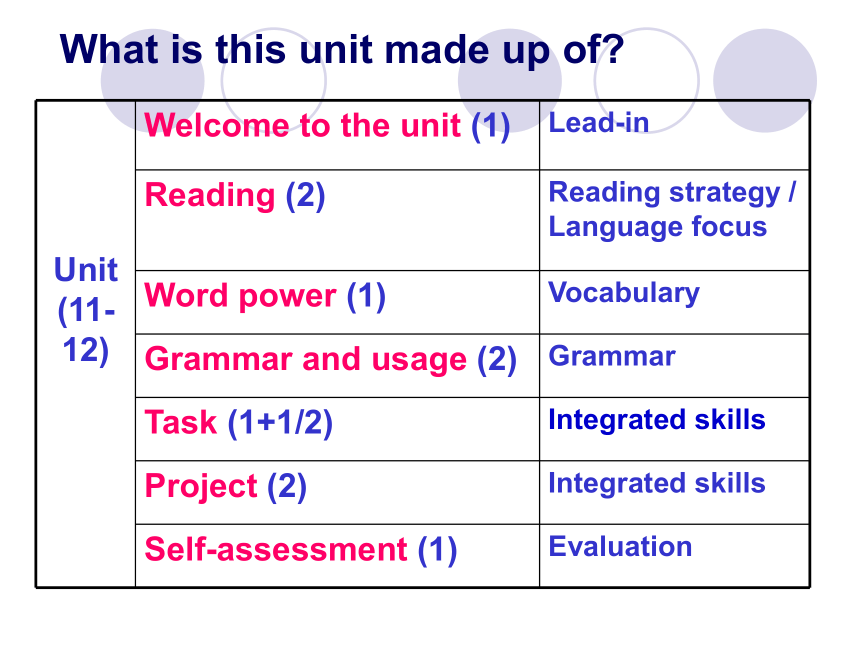
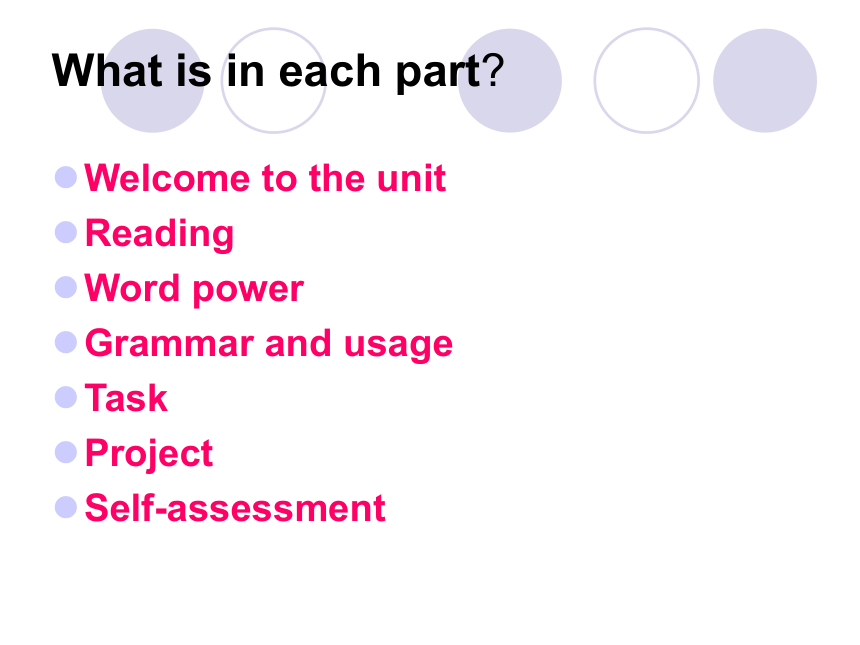
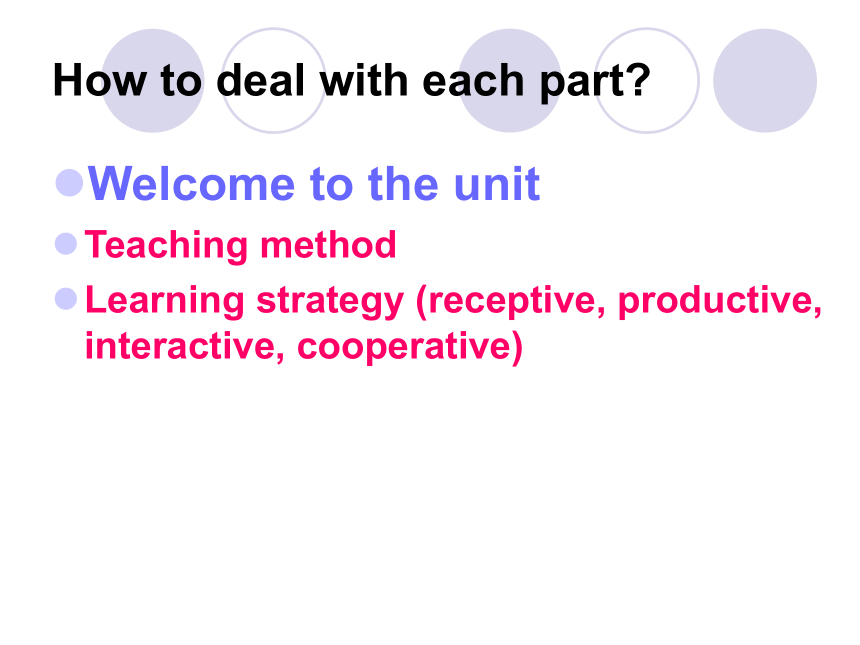
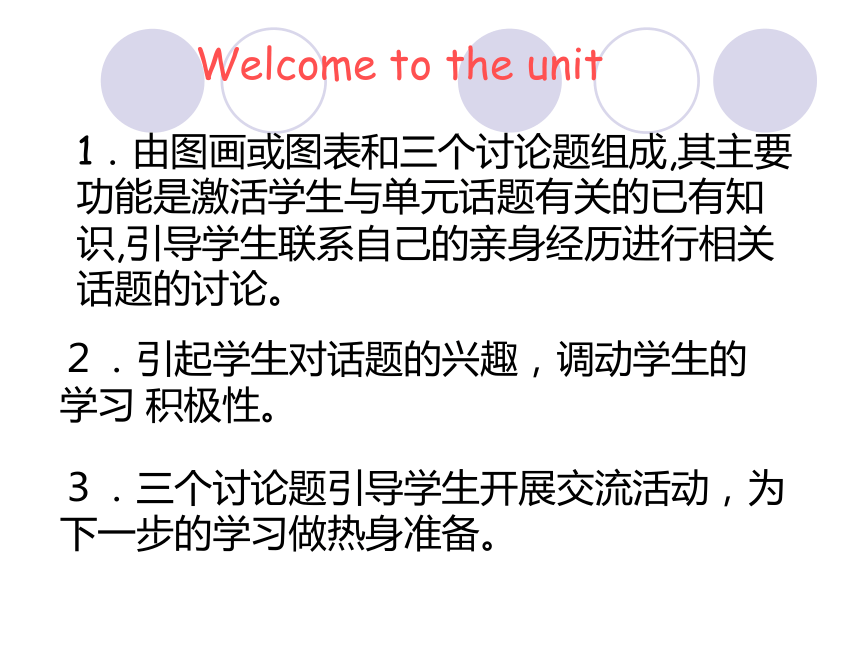
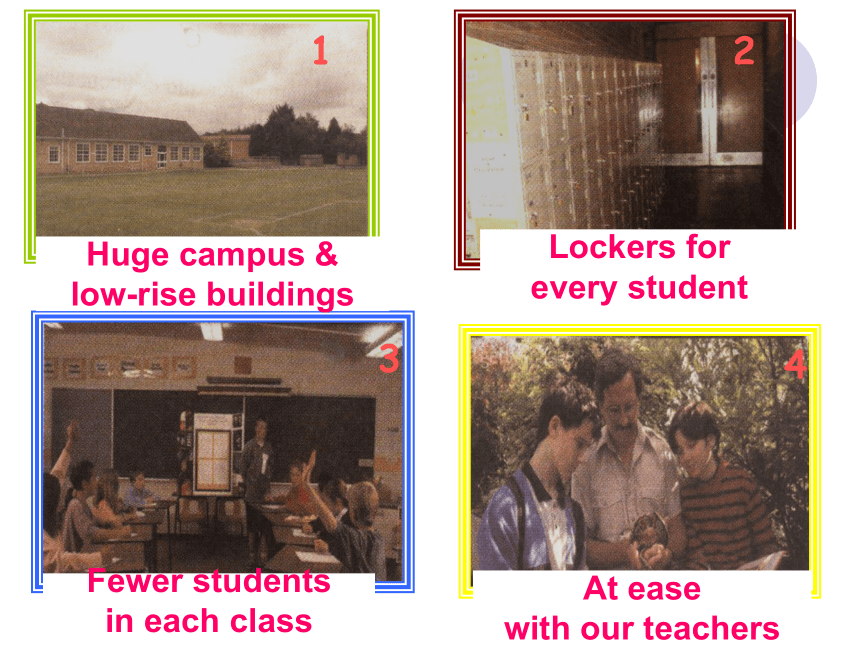
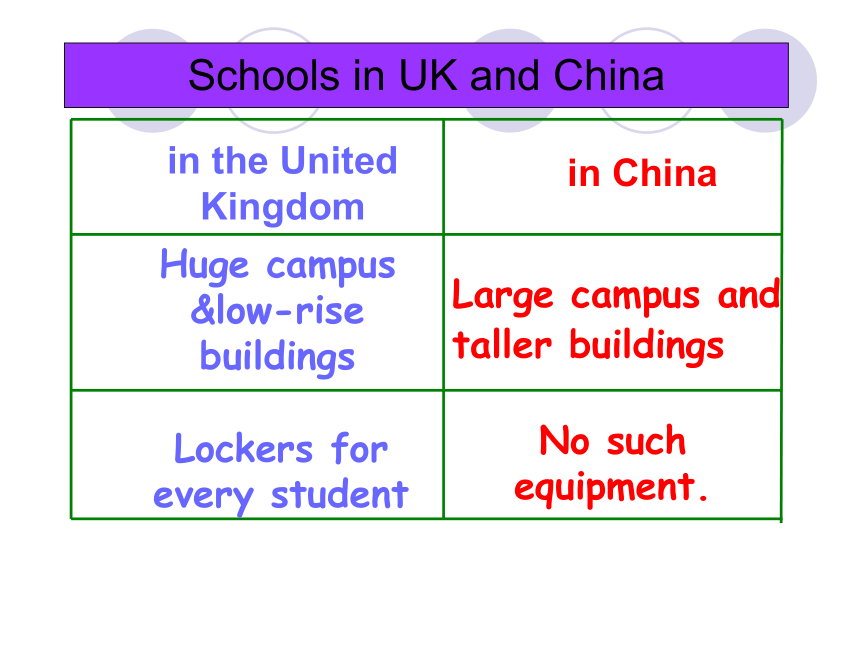
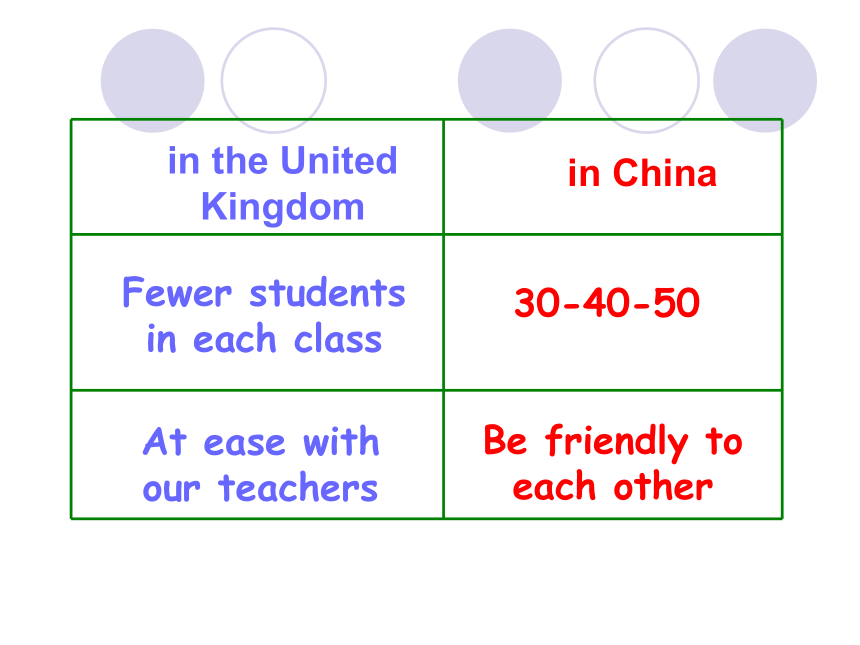
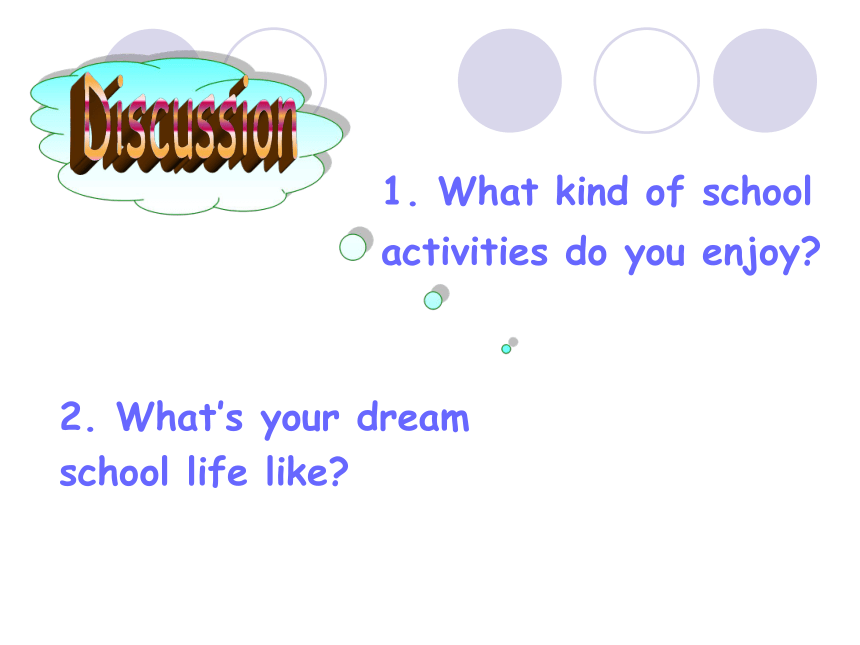
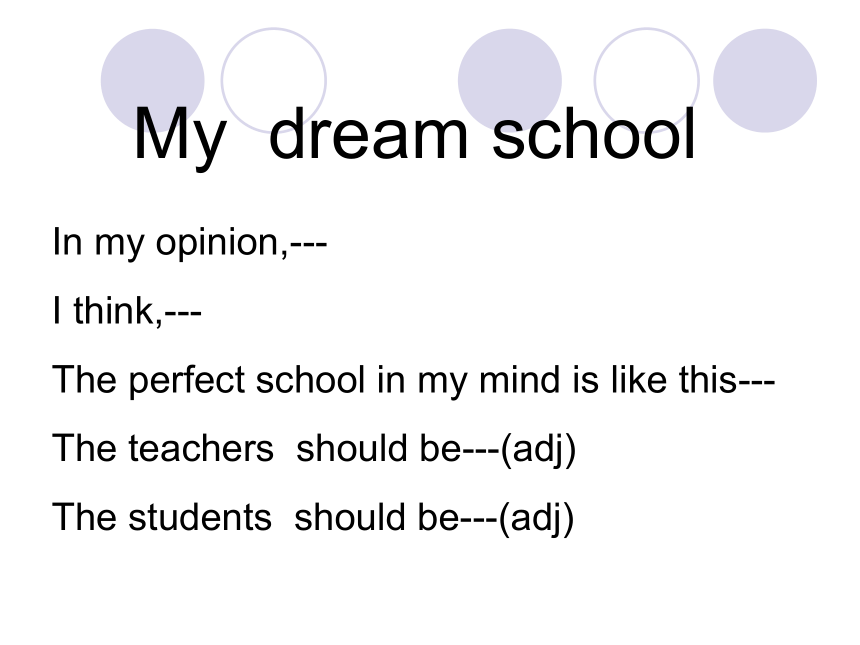
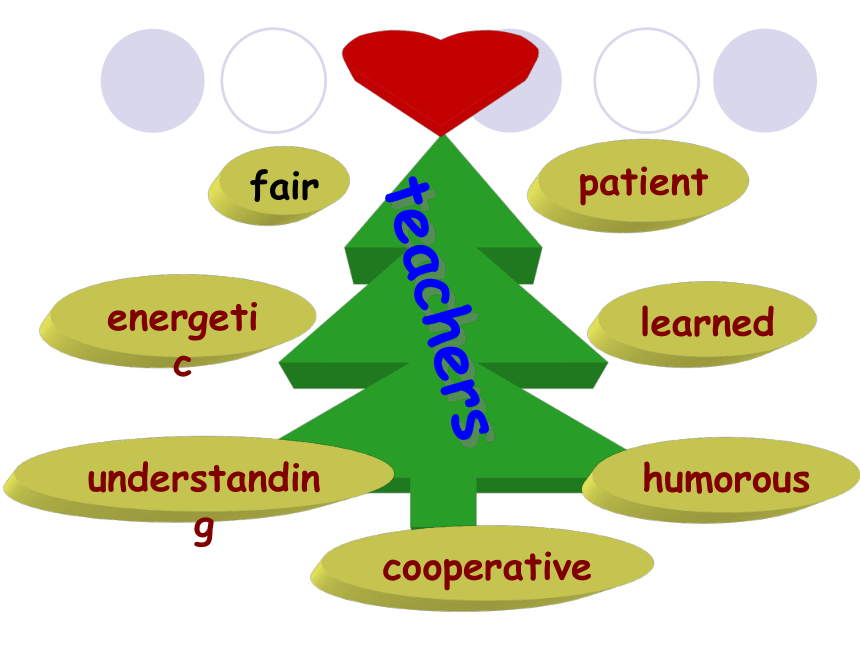
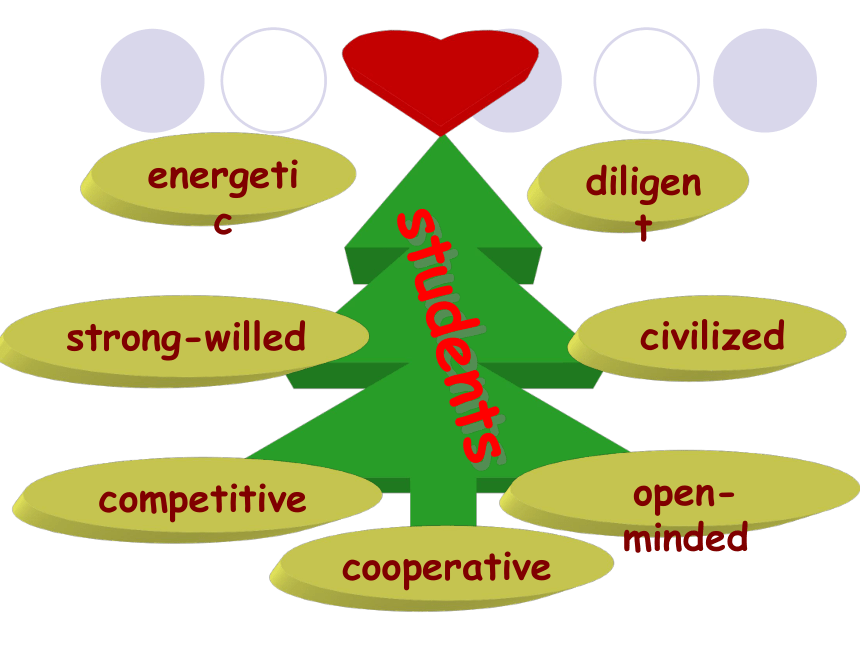
文档简介
课件148张PPT。Unit 1
School Life Module 1 Teenage Experiences Advance With English
What is this unit made up of?What is in each part?Welcome to the unit
Reading
Word power
Grammar and usage
Task
Project
Self-assessmentHow to deal with each part?Welcome to the unit
Teaching method
Learning strategy (receptive, productive, interactive, cooperative)Welcome to the unit1.由图画或图表和三个讨论题组成,其主要 功能是激活学生与单元话题有关的已有知识,引导学生联系自己的亲身经历进行相关话题的讨论。2.引起学生对话题的兴趣,调动学生的学习 积极性。3.三个讨论题引导学生开展交流活动,为下一步的学习做热身准备。Huge campus &
low-rise buildings Lockers for
every studentFewer students
in each classAt ease
with our teachers1234in the United Kingdomin ChinaHuge campus &low-rise buildingsLarge campus and taller buildingsLockers for every studentNo such equipment.Schools in UK and Chinain the United Kingdomin ChinaFewer students in each class30-40-50At ease with our teachersBe friendly to each otherDiscussion2. What’s your dream school life like?1. What kind of school activities do you enjoy?My dream school In my opinion,---
I think,---
The perfect school in my mind is like this---
The teachers should be---(adj)
The students should be---(adj)teachersfairpatientlearnedenergeticunderstandingcooperativehumorousstudentsstrong-willeddiligentopen-mindedenergeticcompetitivecooperativecivilizedteachersstudentsloveunderstandrespectlearn fromhelpencouragewisdomcouragebeliefluckdiligenceperseverancedeterminationcooperationcompetenceconfidenceintelligencesuccessThe voices from your parentsUnit2 Growing painsProblems the father has with his son disobey everything his parents ask him to do be rude to them refuse to spend time with them refuse to do his homework spend too much time watching DVDs, listening to foreign music, playing games and chatting onlineProblems the son has with his fathernot listen to him when he wants to do something or suggests an idea shout at him when he tries to talk to him tell his mother and fight like crazy when he refuses to listen to his father make him do things he doesn’t like call him selfish and unloving when he wants to be alone get very angry when he plays foreign music send him to bed or tell him to study when he watches a DVD forbid him from meeting his friends online Father’s voice:try to listen to my son with respect and care.
learn to understand my son and have a good talk with him.
be more careful and friendly when I talk to my son.
tell my son that I love him deeply.
get to know that growing children don’t always do things as their parents want them to and they are exploring into real life and have their own way to do things.Son’s voice1.understand that my parents always love me .
2. get to know that growing children need advice from adults, especially from parents and teachers .
3.understand that growing children should learn to respect parents and teachers even if they may shout at me when they disagree with each other .
4.learn to make full use of my time though I may find interest in doing things that I enjoy.
5.have a frank talk with father and tell him that he will do well at school. How to deal with each part?Reading
Teaching method
Learning strategyWarming up
Are you doing well in this school?
Have you ever written a letter to a friend about your new school life?Skimming -- to get a general idea1. Who wrote this article?
2. What did she write about?
(Tick the topics mentioned in the text
or make an outline of the text for higher level)School life in the UK□ teachers □ classmates
□ friends □ subjects
□ homework □ grades
□ festivals □ timetable
□ activities □ host family
□ food □ hobbies
□ school rulesReading strategy -- Skimming---- You figured it out so fast. Did you read the text word by word?
---- No. And I don’t have to.
We skim a text when we want to get a general idea of
what it is about.
We can get the general idea from
the title
the first and last sentences of each paragraph
the first and last paragraphs
pictures
charts
…
Scanning -- to get certain information1. Where and how long did Wei Hua
stay in Britain?
2. What was the name of Wei Hua’s class
teacher?
3. How many subjects did she learn in
that year?
4. What do British students eat after their
main meal?
Reading strategy -- Scanning We scan the text when we want to find certain information quickly.
key words and phrases
dates
numbers
…Reading -- to find detailed informationRead the text again carefully and find out the similarities and differences between lives of British and Chinese students.Similarities:
1.The principal tells the students about
the school rules.
2._________________________
3._________________________
4._________________________Thoughts after reading -- to understand the writer better1. How did she feel about her school
life in the UK?
2. What personality do you think the
girl has?
Wei Hua feels…Wei Hua is … Problem solving -- challenging your creativity1. Prepare to interview Wei Hua.
What else do you want to know about her school life in the UK?
2. Imagine your own school life in the UK.
If you were sent to study in a high school in the UK, what would be the biggest challenge?
Language points1.listen to a headmaster talking about...2. know of ; know about; know from ( 区分= tell from) eg: 1) 我不认识他,但是我知道他。
2)他们想了解美国英语和英国英语的区别。
3) 我们应该分清敌友。
I don’t know him but I know of him.They want to know about the differences between American English and British English.We should know a friend from an enemy.talk of / talk about; hear of / hear about/ hear from3. at ease with
1)那老汉悠闲地坐着。
2)He writes with ease.
3)He is living a life of ease.
4) He is at ease with everybody.Homework1. P5 E, P90 Reading A, B
2. Email your friends about your new school life.
3. Read the text again.
Underline useful words and expressions.
Mark the words or sentences that you don’t understand or you are not too sure about. Unit 1 School life
laguage poimtsPresentation of homework 1. Read your email to the class.
(Which one do you prefer?
How to improve your writing?)
2. Read out the useful words and expressions you’ve underlined.
3. Read out the words or the sentences that you don’t understand.Part E, Page 51. I would very much like to be your
pen-friend.
2. First of all, let me introduce myself to you.
3. surf the Internet
4. I do like eating desserts.
5. … as you mentioned in your article
6. I thought of you immediately.
Review the main idea Going to a British high school for one
year will be a very exciting ______ for a
Chinese student. You may see many
______there, such as school hours, class
size, subjects, school activities and so on.
In Britain, school usually ______ around
9a.m. and ______ about 3:30p.m. In each class there are about 30
students. It is the ______ size for
British schools. Schools offer many _____
to the students: English Literature,
Computer Science, Math, Science, Art,
etc. and you can ______ some subjects if
you don’t like them. You can ______ other
subjects that you’re interested in. Teachers are very helpful and homework is
not ______, so that it will make you feel at
______. In a British high school you’ll
surely ______a quite different
way of life!
Words to be discussedattend
prepare
miss
drop
average
attend (v.)*All students went to attend assembly. During the assembly, the headmaster told us about the rules of the school.
In China, children attend school at the age of six.
Attend means _____________.
attend a meetingattend a partyattend a weddingattend a classprepare (v.)* I learned how to buy, prepare and cook food.
First prepare the rice by washing it, then cook it in water.
Prepare means_____________.1. Your class is going to have a New Year Party. What will you do before the party?
2. When the summer holiday came, we prepared to _______________.
3. Who prepares three meals for your family?
Prepare for the partymiss (v.)* I missed Chinese food a lot at lunchtime. British food is very different.
Her son has gone to the USA, and she misses him very much.
Miss means ______________.1. Your best friend is moving to Guangzhou with his family. Before he leaves, what will you say to him?
2. An old country woman comes to the city to live with her son and his wife, but she’s not used to the city life.
She missed . I’ll miss you very much / a lot.living in the countrysidedrop (v.)* You can drop some subjects if you don’t like them, for example, history, and choose other subjects.
They were planning to build a new factory, but had to drop the idea then because they didn’t have enough money.
Drop means ____________________.You’d better drop smoking.Drop everything in your hand and come inside.Shall we drop the subject?average (adj./n.)* In our class there were 29 students. This is about the average size for British schools.
The average of 3, 4 and 11 is 6.
Average means_______________.1. What is the average temperature for
July in Changsha?
____℃
2. What is the average income of your family?
$____
3. Is your school work above / below average?
4. How much do you spend every month on
average?Phrases to be learned and reviewedan enjoyable experience
experience a different way of life
be happy with
earn respect from
achieve high grades
used to do
for free
at lunchtime
on the school field
Sentences to be attended to1. I could get up an hour later than
usual as schools in China begin
before 8 a.m.
2. The homework was not as heavy as
what I used to get in my old school.
3. This sounded like my school in China.
Rewrite the sentences so that they can have the same meaning.
1. Jack is younger than he looks.
Jack isn’t as old as he looks.
2. The station was nearer than I thought.
_________________________
3. I eat out less than I used to.
_________________________
4. The exam was easier than we
expected.
_________________________This sounded like my school in China.1. Your idea sounds better.
2. It sounds like a good idea.
3. She sounds (to be) a strange woman.
4. It sounds as if he doesn’t know the
answer.
Translation1. 这音乐听上去太美了。
2. 听起来你的问题更严重了。
3. 听上去他好象什么都懂似的。As
1) This means I could get up an hour
later than usual as schools in China
begin before 8 a.m.
2) I felt lucky as all my teachers were
very helpful and I enjoyed all my subjects.
3) My English improved a lot as I used English
every day.
4) Cooking was really fun as I learned how to
buy, prepare and cook food.
Other usages of “as”
As they walked along the street, they looked in the shop windows.
As I get older, I get wiser. Cooking was really fun …__________ is great fun.
It is fun to __________.
What fun it is to __________!
Going to a British school for one year was a very enjoyable experience.______(learn) English can be a lot of fun.
______(read) newspapers every day will help you keep up with what is happening.
______(walk) after a meal is a good habit.Writing- challenging your creativityMake sentences / write a short passage with
attend prepare miss
drop average experience
sound for free as
not as…as
…
Homework1. P86 A1, A2, D1, D2
2. Preview P6-7, D
How to deal with each part?Word power
Teaching method
Learning strategy
Unit 1 School lifeWord PowerSchool facilitiesMy School DayHave different classesLibraryHave a walk or chatLaboratory or labSwimming poolGymHave supperDormitory or dormCar parkCanteenIf I get hurt in PE class, where should I go?The medical centerNow, would you please open your books at Page 7. Please finish Part C by using the words we learned just now.Practicecar park, classroom, canteen, library, gym, garden, swimming pool, dormitory, laboratory, medical center1.car park
2.classroom
3.library
4.laboratories
5.gym
The answers to Part C6.swimming pool
7.dormitories
8.medical center
9.canteenW.C.CanteenLecheng TangBasketball courts GymLibraryShopQu Zi LakeChengde Teaching BuildingDacai Teaching BuildingDorms DormsDormsShopSchool gate/entranceReception roomPlaygroundgo straight (on) go across/ through go along/up/down turn left/right walk towards walk/go past walk/go betweenHow to ask the way:
Excuse me, can you tell me the way to … Excuse me, can you tell me how to get to … Excuse me, how can I get to … Excuse me, where is … Excuse me, what is the quickest way to …How to show the way?W.C.CanteenLe ChengtangBasketball courtsGymLibraryShopQu Zi LakeChengde Teaching buildingDacai Teaching BuildingDorms DormsDormsShopSchool gate/entranceReception roomPlaygroundgo straight (on) go across/ through go along/up/down turn left/right walk towards walk/go past walk/go betweenCan you tell me the way to…
How can I get to…
Where is …
Can you tell me how to get to…Brain-stormWhat kind of facilities can we see in the gym? beam rings mat dumb-bell barbell climbing barsBasketball courtSkipping ropeSwimming poolHomeworkGuess what we can see in the canteen, in the library, or in the laboratory, and write down as many things as possible on your exercise books.
Review the new words we have learned today.Word familyschoolholidayHow to deal with each part?Grammar and usage
Teaching method
Learning strategy
1.How was your life in the UK, Wei Hua?
It was enjoyable and exciting.
It was an enjoyable and exciting experience.
2.What did the headmaster told us about?
He told us about the rules of the school.
3.Who was Miss Burke?
She was my favourite teacher.
Which subject did she teach?
She taught us English Literature.
She was the teacher who taught us English
Literature.An interview with Wei HuaRead these sentences from the textbook1.It was an enjoyable and exciting experience.
2.He told us about the rules of the school.
3.I sat next to a girl whose name was Diane.
4.She was the teacher who taught us English
Literature.
5.All my classmates enjoyed the cake that I
made.What rules can you find?
The blue words? The red words?Read the passage on P9 and find out the attributive clauses1. David was one of the most helpful students
that we ever had.
2. In 1998, he went to Oxford University where
he got interested in Chinese culture.
3. Some of the cities in China which he likes
most are Beijing, Shanghai, Harbin and Nanjing.
4. Most of the students that he taught have become his
friends.
5. Some of the books were gifts that he got from his
Chinese friends and students.
6. The paintings that David donated to the school are
being displayed in the assembly hall.1. David was one of the most helpful students that we ever had.
2. She was the teacher who taught us English Literature.
3. Most of the students thatwho whom he taught have become
his friends.
4. I sat next to a girl whose name was Diane.
5. Some of the cities in China which he likes most are Beijing,
Shanghai, Harbin and Nanjing.
6. All my classmates enjoyed the cake that I made.
7. Some of the books were gifts thatwhich he got from his Chinese
friends and students.
8. The paintings thatwhich David donated to the school are being
displayed in the assembly hall.
结论一:关系代词有who /whom/ that /which/ whose, 在从句中充当主语,宾语,定语Talk about the functions of relative pronouns结论二:先行词指“人”时,关系词用who/whom /that/whose1. David was one of the most helpful students
that we ever had.
2. She was the teacher who taught us
English Literature.
3. Most of the students thatwho whom he
taught have become his friends.
4. I sat next to a girl whose name was Diane.结论三:先行词指“物”时,关系词用which/that1. Some of the cities in China which he likes
most are Beijing, Shanghai, Harbin and
Nanjing.
2. All my classmates enjoyed the cake that
I made.
3. Some of the books were gifts thatwhich he
got from his Chinese friends and students.
4. The paintings thatwhich David donated to the
school are being displayed in the assembly
hall.结论四:关系词在定语从句中作宾语时可以省略.1. David was one of the most helpful students (that) we
ever had.
2. She was the teacher who taught us English Literature.
3. Most of the students (thatwho whom) he taught have
become his friends.
4. I sat next to a girl whose name was Diane.
5. Some of the cities in China (which) he likes most are
Beijing, Shanghai, Harbin and Nanjing.
6. All my classmates enjoyed the cake (that) I made.
7. Some of the books were gifts (thatwhich) he got from
his Chinese friends and students.
8. The paintings (thatwhich) David donated to the school
are being displayed in the assembly hall.(1) 先行词为all, everything, nothing, something,
anything, little, much 等不定代词时;(2)先行词被all, every, no, some, any, little, much等
修饰时;(3)先行词被序数词或最高级修饰时;(4)先行词被the only, the very, the same, the last
修饰时。注意几种只用that的情况:Practice: Page 10Two friends are talking about where to go after school. Complete their conversation with who, whom, which, that or whose. There might be more than one answer for some blanks.Check their answers and correct their mistakes.I am sure she has something (that) you can borrow.I’ve read all the books that are not mine. This is the first book (that) he has ever read.This is the very book that belongs to him.Sum upThe scientist we met yesterday is very
famous in the world.(2) The dress is new. She is wearing it.The dress that she is wearing is new.
which
? (1) The scientist is very famous in the world. We met her yesterday. ?
Who
whom
that
who/thatwhich /thatwhom/who /thatwhich/thatwhosewhose/of whichA relative pronoun can be omitted when it is used as the object in the attributive clause.Homework: 1.Talk about the antecedents and relative pronouns. 2. Finish C1, C2 in your Workbook (P88)How to deal with each part?Task
Teaching method
Learning strategy
Task Reporting school activitiesSkill building 1: understanding a programmeImportant information of a school
programme timetable:
*date
*day
*time
*venue
*event/ activity:Topic
Speaker How to complete a school programme timetable?Date :
1st January
2nd February
3rd September 1st / 1 Jan
2nd/ 2 Feb
3rd/ 3 Sept abbreviation Mon / Tue / Wed / Thur / Fir / Sat / Sun Day :Time :A.E.: 9 a.m.
6.45 p.m.B.E.: 09.00
18.45Venue : e.g.: 1. Assembly hall 2. 7th floor, Park Hotel 3. Room 405, Building 12Listening I : Complete the timetable The mayor is telling his secretary about his visit to several schools. 21 Oct9.30 am22 Oct23 OctTuesdayWednesday 12.45 pm6.00 pmGuanghua High SchoolShangming High SchoolAttend assemblyGo to concertStep 1 Completing a timetable for a school programmeListening II :
As one of the monitors, complete the timetable of the talks for next month.( P 13 )Skill building 2: Comparing informationDo read it carefully and make
comparison at all aspects.
e.g.: P 14 Read the letter and choose the correct book from the information.Compare the timetable on P13 & P15 : You can skip Library Class, Class Meeting, Games and Self-study to attend the talks.
Tips :
1. Read carefully and circle the
classes you can skip.
2. Compare and write down the
talks you can attend. Homework : Reporting to your class teacher Make a dialogue with your partner. One plays the role of the monitor, and the other class teacher.
Act it out tomorrow.Skills building 3 : Write a notice 1. What is a notice?
2. What’s the important information?
(time, dates, events, person that
issues it, etc. Or : When? Where?
Who ? What ? etc.)
Read “ READER NOTICE”.
Try to underline the important information.Step 3: Informing your classmatesInform your classmates of all the talks you can attend next month. ( refer to P 15 )
Begin with :
“ I am happy to inform you that_______ _________________________________”
Tips :
Include all the important information.
Make sure it is clear, brief and attractive.How to prepare an oral notice?Ladies and gentlemen! May I have your attention please?
….
…
…
That’s all. Thank you.WritingP17
Write a notice to inform your classmates of the program.
Present it to the class.Sample 1(written):Notice
Talks in October
I am happy to inform you that in October we are going to attend five interesting and informative talks.
Read the following to get some detailed information about the five talks.
…
Li HuaSample 2(oral):Hi, everybody! May I have you attention, please?
In October we are going to attend five interesting and informative talks.
Here they go: …
That’s all. Thank you.Homework1. Finish the notice.
2. Preview P18.
Read the text again and again.
Underline useful words and
expressions.
Mark the words or sentences that
you don’t quite understand.
How to deal with each part?Project
Teaching method
Learning strategy
Clubs in our schoolReading -- to get some information about school clubsRadio Club
Read and find out:
Who? ________________
When? _______________
Why? ________________
What? _______________
What else do you want to know? ___________Our radio club1. Our radio club is ____ by the
students.
2. It was started two years ago as CD
players were not ____ in school.
3. The headmaster ____ the idea.
4. Our club is ____ just music.
5. The teachers want us to ____some
news.
6. During exam time, a special program
tells students the things they should
or shouldn’t do for ____.
7. We also give special messages to
____ the parents ____ the events
such as outings and school plays.
8. I’m ____ soon. I shall miss the radio
club. I know it will ____ without me.Poets of the Next Generation Club1. Guess why they gave it such an
interesting name?
2. Read and find out:
Who? _____________
When? ____________
What? _____________Poets of the Next Generation
poem, select, require, scary, nature, Introducing the project1. Which of the two clubs would you
like to join? Give your reasons.
2. Or have you ever wanted to find out
what clubs there are in NSFZ? Or do
you want to start a club of your own
which people were able to join? Well,
here is your chance!Starting the project -- How to set up a school club Planning
Preparing
Producing
Presenting
Planning (Day 1-2)1. Form groups.
2. Suggest clubs you will start.
3. Give your reasons and discuss.
4. Vote to decide.
5. Have it approved by the teacher.
6. Write down the name.
7. Take on responsibility for tasks.(take turns)We would like to start _______________.
Information-researcher:_____________
Poster-maker: ___________________
Poster-presenter: __________________Preparing (Day 3)1. Find one or two posters about
school clubs.
2. Discuss information about these
posters.
3. Decide what can be learned from
them.
4. Form your own idea about your club.Discuss about the information found:
1. What does the club do?
2. How does it attract new members?
3. How does it help members achieve
their goals?
4. What does the poster consist of?
5. How does it attract viewers?
…
(These sample questions will be given to each group in written form)Producing (Day4-6)1. Draft the poster.
2. Read carefully and make suggestions.
3. Make some changes and finalize the
poster.
4. Approve the poster.Presenting (Day 7)1. Present each poster to the class.
2. Put the poster on display.
3. Give awards to the winners.
(Evaluation from both teachers and
students)How to deal with each part?Self-assessment
Teaching method
Learning strategy
M1-U1 Period 10
Self-assessment
Word usage of Unit 1Attend / join / join in / take part in
1.Tomorrow I will go to ____ an important
meeting.
2.?Would you please ____ a walk after lunch?
3. He likes ____ all kinds of outdoor activities
actively.
4.?Would you like to ____ our radio club?
5. Every Sunday the old lady would go
to ____ church.
prepare, prepare for,
prepared,
preparation
1.?We worked hard, ____ the final exam.
2.?Please get ____ for the sports meet.
3. Mum is ____ Dad to go on a business
trip.
4. We are making ______ for the 2008
Olympic Games.
miss / missing
1. My mind wasn’t on what he was saying so
I’m afraid I ____ half of it.
A. was missing B. had missed
C. will miss D. missed
2. Two pages ____ in the book I bought
yesterday.
A. were missing B. missed
C. have missed D. were missed
experience, experienced
1.? He has two years’ ____ in teaching.
2.? She’s very ____ in money matters.
3. They ____ great difficulties during
the experiment.
4. He had a lot of interesting ____ in
Africa.
not a bit / not a little
1. I’m ____ hungry tonight, so I’m not
going to eat anything.
2. He sounded quiet at the news, ____
angry.
3. She was ____ anxious as she hadn’t
seen her son for a week.
develop
1. Bob, get this film ____. I want to know if
this camera works.
A. washed B. developed
C. printed D. shown
2. ---- Does Peter still feel lonely in the new
school?
---- Not any more. He has ____ a friendship
with most of his classmates.
A. made B. become C. developed D. taken
3.?We believe that sports can ____ mind and
body.
A. develop B. help C. build D. exercise
Practice about attributive clauses1. The hours ____ kids spend with their
parents are becoming less and less.
2. My father bought a painting, ____ price
was very high.
3. As a teacher, I seldom give my students
questions ____ they cannot work out.
4. Only those ____ knows well could come
in.
ListeningListening A, B, C on P92Self-assessment chartComplete the chart on P20Unit wrap-upA school is a place of education for children.
----Longman
School is like a game; some days you feel like a winner; other days you feel like a loser. That is the way it is. You’ll have your good days and your bad days, just like every single kid at your school. Language learning is a long process, we teachers need patience, as well as the students. In order to be patient, we need new ideas every day. In order to be creative, we need to cooperate with other teachers and our students.
In one word, our work is made up of patience, creativity and cooperation.
Thank you!
Time arrangement (2)Each unit -- 2 or 3 weeks
Each week --Textbook (2-5)
+ Extensive reading(6)
Practice1. Learning procedure
preview – attend classes – review
2 Homework
about the textbook
reading (English learners’ lighthouse / NCE 2 lessons each week)
3. After class
Listening: 15-20 minutes each day
(CCTV Channel 9 / Crazy English …)
Reading: 300-400 words each day
(English learners’ lighthouse…
A reading list will be given to you soon.)
4. Exercise-books
2 for About the Text
1 for Reading Journal
1 for Word Bank
1 for Correcting Mistakes
How can we do betterPrepare your lessons well before every class
Review what you’ve learned in time
Read more and read different materials
Listen more and listen to different materialsWrite as often as possible
Talk more either in class or out of class
Take an active part in activities in English
Turn to your teachers for advice and help
Reading
Word power
Grammar and usage
Task
Project
Self-assessmentHow to deal with each part?Welcome to the unit
Teaching method
Learning strategy (receptive, productive, interactive, cooperative)Welcome to the unit1.由图画或图表和三个讨论题组成,其主要 功能是激活学生与单元话题有关的已有知识,引导学生联系自己的亲身经历进行相关话题的讨论。2.引起学生对话题的兴趣,调动学生的学习 积极性。3.三个讨论题引导学生开展交流活动,为下一步的学习做热身准备。Huge campus &
low-rise buildings Lockers for
every studentFewer students
in each classAt ease
with our teachers1234in the United Kingdomin ChinaHuge campus &low-rise buildingsLarge campus and taller buildingsLockers for every studentNo such equipment.Schools in UK and Chinain the United Kingdomin ChinaFewer students in each class30-40-50At ease with our teachersBe friendly to each otherDiscussion2. What’s your dream school life like?1. What kind of school activities do you enjoy?My dream school In my opinion,---
I think,---
The perfect school in my mind is like this---
The teachers should be---(adj)
The students should be---(adj)teachersfairpatientlearnedenergeticunderstandingcooperativehumorousstudentsstrong-willeddiligentopen-mindedenergeticcompetitivecooperativecivilizedteachersstudentsloveunderstandrespectlearn fromhelpencouragewisdomcouragebeliefluckdiligenceperseverancedeterminationcooperationcompetenceconfidenceintelligencesuccessThe voices from your parentsUnit2 Growing painsProblems the father has with his son disobey everything his parents ask him to do be rude to them refuse to spend time with them refuse to do his homework spend too much time watching DVDs, listening to foreign music, playing games and chatting onlineProblems the son has with his fathernot listen to him when he wants to do something or suggests an idea shout at him when he tries to talk to him tell his mother and fight like crazy when he refuses to listen to his father make him do things he doesn’t like call him selfish and unloving when he wants to be alone get very angry when he plays foreign music send him to bed or tell him to study when he watches a DVD forbid him from meeting his friends online Father’s voice:try to listen to my son with respect and care.
learn to understand my son and have a good talk with him.
be more careful and friendly when I talk to my son.
tell my son that I love him deeply.
get to know that growing children don’t always do things as their parents want them to and they are exploring into real life and have their own way to do things.Son’s voice1.understand that my parents always love me .
2. get to know that growing children need advice from adults, especially from parents and teachers .
3.understand that growing children should learn to respect parents and teachers even if they may shout at me when they disagree with each other .
4.learn to make full use of my time though I may find interest in doing things that I enjoy.
5.have a frank talk with father and tell him that he will do well at school. How to deal with each part?Reading
Teaching method
Learning strategyWarming up
Are you doing well in this school?
Have you ever written a letter to a friend about your new school life?Skimming -- to get a general idea1. Who wrote this article?
2. What did she write about?
(Tick the topics mentioned in the text
or make an outline of the text for higher level)School life in the UK□ teachers □ classmates
□ friends □ subjects
□ homework □ grades
□ festivals □ timetable
□ activities □ host family
□ food □ hobbies
□ school rulesReading strategy -- Skimming---- You figured it out so fast. Did you read the text word by word?
---- No. And I don’t have to.
We skim a text when we want to get a general idea of
what it is about.
We can get the general idea from
the title
the first and last sentences of each paragraph
the first and last paragraphs
pictures
charts
…
Scanning -- to get certain information1. Where and how long did Wei Hua
stay in Britain?
2. What was the name of Wei Hua’s class
teacher?
3. How many subjects did she learn in
that year?
4. What do British students eat after their
main meal?
Reading strategy -- Scanning We scan the text when we want to find certain information quickly.
key words and phrases
dates
numbers
…Reading -- to find detailed informationRead the text again carefully and find out the similarities and differences between lives of British and Chinese students.Similarities:
1.The principal tells the students about
the school rules.
2._________________________
3._________________________
4._________________________Thoughts after reading -- to understand the writer better1. How did she feel about her school
life in the UK?
2. What personality do you think the
girl has?
Wei Hua feels…Wei Hua is … Problem solving -- challenging your creativity1. Prepare to interview Wei Hua.
What else do you want to know about her school life in the UK?
2. Imagine your own school life in the UK.
If you were sent to study in a high school in the UK, what would be the biggest challenge?
Language points1.listen to a headmaster talking about...2. know of ; know about; know from ( 区分= tell from) eg: 1) 我不认识他,但是我知道他。
2)他们想了解美国英语和英国英语的区别。
3) 我们应该分清敌友。
I don’t know him but I know of him.They want to know about the differences between American English and British English.We should know a friend from an enemy.talk of / talk about; hear of / hear about/ hear from3. at ease with
1)那老汉悠闲地坐着。
2)He writes with ease.
3)He is living a life of ease.
4) He is at ease with everybody.Homework1. P5 E, P90 Reading A, B
2. Email your friends about your new school life.
3. Read the text again.
Underline useful words and expressions.
Mark the words or sentences that you don’t understand or you are not too sure about. Unit 1 School life
laguage poimtsPresentation of homework 1. Read your email to the class.
(Which one do you prefer?
How to improve your writing?)
2. Read out the useful words and expressions you’ve underlined.
3. Read out the words or the sentences that you don’t understand.Part E, Page 51. I would very much like to be your
pen-friend.
2. First of all, let me introduce myself to you.
3. surf the Internet
4. I do like eating desserts.
5. … as you mentioned in your article
6. I thought of you immediately.
Review the main idea Going to a British high school for one
year will be a very exciting ______ for a
Chinese student. You may see many
______there, such as school hours, class
size, subjects, school activities and so on.
In Britain, school usually ______ around
9a.m. and ______ about 3:30p.m. In each class there are about 30
students. It is the ______ size for
British schools. Schools offer many _____
to the students: English Literature,
Computer Science, Math, Science, Art,
etc. and you can ______ some subjects if
you don’t like them. You can ______ other
subjects that you’re interested in. Teachers are very helpful and homework is
not ______, so that it will make you feel at
______. In a British high school you’ll
surely ______a quite different
way of life!
Words to be discussedattend
prepare
miss
drop
average
attend (v.)*All students went to attend assembly. During the assembly, the headmaster told us about the rules of the school.
In China, children attend school at the age of six.
Attend means _____________.
attend a meetingattend a partyattend a weddingattend a classprepare (v.)* I learned how to buy, prepare and cook food.
First prepare the rice by washing it, then cook it in water.
Prepare means_____________.1. Your class is going to have a New Year Party. What will you do before the party?
2. When the summer holiday came, we prepared to _______________.
3. Who prepares three meals for your family?
Prepare for the partymiss (v.)* I missed Chinese food a lot at lunchtime. British food is very different.
Her son has gone to the USA, and she misses him very much.
Miss means ______________.1. Your best friend is moving to Guangzhou with his family. Before he leaves, what will you say to him?
2. An old country woman comes to the city to live with her son and his wife, but she’s not used to the city life.
She missed . I’ll miss you very much / a lot.living in the countrysidedrop (v.)* You can drop some subjects if you don’t like them, for example, history, and choose other subjects.
They were planning to build a new factory, but had to drop the idea then because they didn’t have enough money.
Drop means ____________________.You’d better drop smoking.Drop everything in your hand and come inside.Shall we drop the subject?average (adj./n.)* In our class there were 29 students. This is about the average size for British schools.
The average of 3, 4 and 11 is 6.
Average means_______________.1. What is the average temperature for
July in Changsha?
____℃
2. What is the average income of your family?
$____
3. Is your school work above / below average?
4. How much do you spend every month on
average?Phrases to be learned and reviewedan enjoyable experience
experience a different way of life
be happy with
earn respect from
achieve high grades
used to do
for free
at lunchtime
on the school field
Sentences to be attended to1. I could get up an hour later than
usual as schools in China begin
before 8 a.m.
2. The homework was not as heavy as
what I used to get in my old school.
3. This sounded like my school in China.
Rewrite the sentences so that they can have the same meaning.
1. Jack is younger than he looks.
Jack isn’t as old as he looks.
2. The station was nearer than I thought.
_________________________
3. I eat out less than I used to.
_________________________
4. The exam was easier than we
expected.
_________________________This sounded like my school in China.1. Your idea sounds better.
2. It sounds like a good idea.
3. She sounds (to be) a strange woman.
4. It sounds as if he doesn’t know the
answer.
Translation1. 这音乐听上去太美了。
2. 听起来你的问题更严重了。
3. 听上去他好象什么都懂似的。As
1) This means I could get up an hour
later than usual as schools in China
begin before 8 a.m.
2) I felt lucky as all my teachers were
very helpful and I enjoyed all my subjects.
3) My English improved a lot as I used English
every day.
4) Cooking was really fun as I learned how to
buy, prepare and cook food.
Other usages of “as”
As they walked along the street, they looked in the shop windows.
As I get older, I get wiser. Cooking was really fun …__________ is great fun.
It is fun to __________.
What fun it is to __________!
Going to a British school for one year was a very enjoyable experience.______(learn) English can be a lot of fun.
______(read) newspapers every day will help you keep up with what is happening.
______(walk) after a meal is a good habit.Writing- challenging your creativityMake sentences / write a short passage with
attend prepare miss
drop average experience
sound for free as
not as…as
…
Homework1. P86 A1, A2, D1, D2
2. Preview P6-7, D
How to deal with each part?Word power
Teaching method
Learning strategy
Unit 1 School lifeWord PowerSchool facilitiesMy School DayHave different classesLibraryHave a walk or chatLaboratory or labSwimming poolGymHave supperDormitory or dormCar parkCanteenIf I get hurt in PE class, where should I go?The medical centerNow, would you please open your books at Page 7. Please finish Part C by using the words we learned just now.Practicecar park, classroom, canteen, library, gym, garden, swimming pool, dormitory, laboratory, medical center1.car park
2.classroom
3.library
4.laboratories
5.gym
The answers to Part C6.swimming pool
7.dormitories
8.medical center
9.canteenW.C.CanteenLecheng TangBasketball courts GymLibraryShopQu Zi LakeChengde Teaching BuildingDacai Teaching BuildingDorms DormsDormsShopSchool gate/entranceReception roomPlaygroundgo straight (on) go across/ through go along/up/down turn left/right walk towards walk/go past walk/go betweenHow to ask the way:
Excuse me, can you tell me the way to … Excuse me, can you tell me how to get to … Excuse me, how can I get to … Excuse me, where is … Excuse me, what is the quickest way to …How to show the way?W.C.CanteenLe ChengtangBasketball courtsGymLibraryShopQu Zi LakeChengde Teaching buildingDacai Teaching BuildingDorms DormsDormsShopSchool gate/entranceReception roomPlaygroundgo straight (on) go across/ through go along/up/down turn left/right walk towards walk/go past walk/go betweenCan you tell me the way to…
How can I get to…
Where is …
Can you tell me how to get to…Brain-stormWhat kind of facilities can we see in the gym? beam rings mat dumb-bell barbell climbing barsBasketball courtSkipping ropeSwimming poolHomeworkGuess what we can see in the canteen, in the library, or in the laboratory, and write down as many things as possible on your exercise books.
Review the new words we have learned today.Word familyschoolholidayHow to deal with each part?Grammar and usage
Teaching method
Learning strategy
1.How was your life in the UK, Wei Hua?
It was enjoyable and exciting.
It was an enjoyable and exciting experience.
2.What did the headmaster told us about?
He told us about the rules of the school.
3.Who was Miss Burke?
She was my favourite teacher.
Which subject did she teach?
She taught us English Literature.
She was the teacher who taught us English
Literature.An interview with Wei HuaRead these sentences from the textbook1.It was an enjoyable and exciting experience.
2.He told us about the rules of the school.
3.I sat next to a girl whose name was Diane.
4.She was the teacher who taught us English
Literature.
5.All my classmates enjoyed the cake that I
made.What rules can you find?
The blue words? The red words?Read the passage on P9 and find out the attributive clauses1. David was one of the most helpful students
that we ever had.
2. In 1998, he went to Oxford University where
he got interested in Chinese culture.
3. Some of the cities in China which he likes
most are Beijing, Shanghai, Harbin and Nanjing.
4. Most of the students that he taught have become his
friends.
5. Some of the books were gifts that he got from his
Chinese friends and students.
6. The paintings that David donated to the school are
being displayed in the assembly hall.1. David was one of the most helpful students that we ever had.
2. She was the teacher who taught us English Literature.
3. Most of the students thatwho whom he taught have become
his friends.
4. I sat next to a girl whose name was Diane.
5. Some of the cities in China which he likes most are Beijing,
Shanghai, Harbin and Nanjing.
6. All my classmates enjoyed the cake that I made.
7. Some of the books were gifts thatwhich he got from his Chinese
friends and students.
8. The paintings thatwhich David donated to the school are being
displayed in the assembly hall.
结论一:关系代词有who /whom/ that /which/ whose, 在从句中充当主语,宾语,定语Talk about the functions of relative pronouns结论二:先行词指“人”时,关系词用who/whom /that/whose1. David was one of the most helpful students
that we ever had.
2. She was the teacher who taught us
English Literature.
3. Most of the students thatwho whom he
taught have become his friends.
4. I sat next to a girl whose name was Diane.结论三:先行词指“物”时,关系词用which/that1. Some of the cities in China which he likes
most are Beijing, Shanghai, Harbin and
Nanjing.
2. All my classmates enjoyed the cake that
I made.
3. Some of the books were gifts thatwhich he
got from his Chinese friends and students.
4. The paintings thatwhich David donated to the
school are being displayed in the assembly
hall.结论四:关系词在定语从句中作宾语时可以省略.1. David was one of the most helpful students (that) we
ever had.
2. She was the teacher who taught us English Literature.
3. Most of the students (thatwho whom) he taught have
become his friends.
4. I sat next to a girl whose name was Diane.
5. Some of the cities in China (which) he likes most are
Beijing, Shanghai, Harbin and Nanjing.
6. All my classmates enjoyed the cake (that) I made.
7. Some of the books were gifts (thatwhich) he got from
his Chinese friends and students.
8. The paintings (thatwhich) David donated to the school
are being displayed in the assembly hall.(1) 先行词为all, everything, nothing, something,
anything, little, much 等不定代词时;(2)先行词被all, every, no, some, any, little, much等
修饰时;(3)先行词被序数词或最高级修饰时;(4)先行词被the only, the very, the same, the last
修饰时。注意几种只用that的情况:Practice: Page 10Two friends are talking about where to go after school. Complete their conversation with who, whom, which, that or whose. There might be more than one answer for some blanks.Check their answers and correct their mistakes.I am sure she has something (that) you can borrow.I’ve read all the books that are not mine. This is the first book (that) he has ever read.This is the very book that belongs to him.Sum upThe scientist we met yesterday is very
famous in the world.(2) The dress is new. She is wearing it.The dress that she is wearing is new.
which
? (1) The scientist is very famous in the world. We met her yesterday. ?
Who
whom
that
who/thatwhich /thatwhom/who /thatwhich/thatwhosewhose/of whichA relative pronoun can be omitted when it is used as the object in the attributive clause.Homework: 1.Talk about the antecedents and relative pronouns. 2. Finish C1, C2 in your Workbook (P88)How to deal with each part?Task
Teaching method
Learning strategy
Task Reporting school activitiesSkill building 1: understanding a programmeImportant information of a school
programme timetable:
*date
*day
*time
*venue
*event/ activity:Topic
Speaker How to complete a school programme timetable?Date :
1st January
2nd February
3rd September 1st / 1 Jan
2nd/ 2 Feb
3rd/ 3 Sept abbreviation Mon / Tue / Wed / Thur / Fir / Sat / Sun Day :Time :A.E.: 9 a.m.
6.45 p.m.B.E.: 09.00
18.45Venue : e.g.: 1. Assembly hall 2. 7th floor, Park Hotel 3. Room 405, Building 12Listening I : Complete the timetable The mayor is telling his secretary about his visit to several schools. 21 Oct9.30 am22 Oct23 OctTuesdayWednesday 12.45 pm6.00 pmGuanghua High SchoolShangming High SchoolAttend assemblyGo to concertStep 1 Completing a timetable for a school programmeListening II :
As one of the monitors, complete the timetable of the talks for next month.( P 13 )Skill building 2: Comparing informationDo read it carefully and make
comparison at all aspects.
e.g.: P 14 Read the letter and choose the correct book from the information.Compare the timetable on P13 & P15 : You can skip Library Class, Class Meeting, Games and Self-study to attend the talks.
Tips :
1. Read carefully and circle the
classes you can skip.
2. Compare and write down the
talks you can attend. Homework : Reporting to your class teacher Make a dialogue with your partner. One plays the role of the monitor, and the other class teacher.
Act it out tomorrow.Skills building 3 : Write a notice 1. What is a notice?
2. What’s the important information?
(time, dates, events, person that
issues it, etc. Or : When? Where?
Who ? What ? etc.)
Read “ READER NOTICE”.
Try to underline the important information.Step 3: Informing your classmatesInform your classmates of all the talks you can attend next month. ( refer to P 15 )
Begin with :
“ I am happy to inform you that_______ _________________________________”
Tips :
Include all the important information.
Make sure it is clear, brief and attractive.How to prepare an oral notice?Ladies and gentlemen! May I have your attention please?
….
…
…
That’s all. Thank you.WritingP17
Write a notice to inform your classmates of the program.
Present it to the class.Sample 1(written):Notice
Talks in October
I am happy to inform you that in October we are going to attend five interesting and informative talks.
Read the following to get some detailed information about the five talks.
…
Li HuaSample 2(oral):Hi, everybody! May I have you attention, please?
In October we are going to attend five interesting and informative talks.
Here they go: …
That’s all. Thank you.Homework1. Finish the notice.
2. Preview P18.
Read the text again and again.
Underline useful words and
expressions.
Mark the words or sentences that
you don’t quite understand.
How to deal with each part?Project
Teaching method
Learning strategy
Clubs in our schoolReading -- to get some information about school clubsRadio Club
Read and find out:
Who? ________________
When? _______________
Why? ________________
What? _______________
What else do you want to know? ___________Our radio club1. Our radio club is ____ by the
students.
2. It was started two years ago as CD
players were not ____ in school.
3. The headmaster ____ the idea.
4. Our club is ____ just music.
5. The teachers want us to ____some
news.
6. During exam time, a special program
tells students the things they should
or shouldn’t do for ____.
7. We also give special messages to
____ the parents ____ the events
such as outings and school plays.
8. I’m ____ soon. I shall miss the radio
club. I know it will ____ without me.Poets of the Next Generation Club1. Guess why they gave it such an
interesting name?
2. Read and find out:
Who? _____________
When? ____________
What? _____________Poets of the Next Generation
poem, select, require, scary, nature, Introducing the project1. Which of the two clubs would you
like to join? Give your reasons.
2. Or have you ever wanted to find out
what clubs there are in NSFZ? Or do
you want to start a club of your own
which people were able to join? Well,
here is your chance!Starting the project -- How to set up a school club Planning
Preparing
Producing
Presenting
Planning (Day 1-2)1. Form groups.
2. Suggest clubs you will start.
3. Give your reasons and discuss.
4. Vote to decide.
5. Have it approved by the teacher.
6. Write down the name.
7. Take on responsibility for tasks.(take turns)We would like to start _______________.
Information-researcher:_____________
Poster-maker: ___________________
Poster-presenter: __________________Preparing (Day 3)1. Find one or two posters about
school clubs.
2. Discuss information about these
posters.
3. Decide what can be learned from
them.
4. Form your own idea about your club.Discuss about the information found:
1. What does the club do?
2. How does it attract new members?
3. How does it help members achieve
their goals?
4. What does the poster consist of?
5. How does it attract viewers?
…
(These sample questions will be given to each group in written form)Producing (Day4-6)1. Draft the poster.
2. Read carefully and make suggestions.
3. Make some changes and finalize the
poster.
4. Approve the poster.Presenting (Day 7)1. Present each poster to the class.
2. Put the poster on display.
3. Give awards to the winners.
(Evaluation from both teachers and
students)How to deal with each part?Self-assessment
Teaching method
Learning strategy
M1-U1 Period 10
Self-assessment
Word usage of Unit 1Attend / join / join in / take part in
1.Tomorrow I will go to ____ an important
meeting.
2.?Would you please ____ a walk after lunch?
3. He likes ____ all kinds of outdoor activities
actively.
4.?Would you like to ____ our radio club?
5. Every Sunday the old lady would go
to ____ church.
prepare, prepare for,
prepared,
preparation
1.?We worked hard, ____ the final exam.
2.?Please get ____ for the sports meet.
3. Mum is ____ Dad to go on a business
trip.
4. We are making ______ for the 2008
Olympic Games.
miss / missing
1. My mind wasn’t on what he was saying so
I’m afraid I ____ half of it.
A. was missing B. had missed
C. will miss D. missed
2. Two pages ____ in the book I bought
yesterday.
A. were missing B. missed
C. have missed D. were missed
experience, experienced
1.? He has two years’ ____ in teaching.
2.? She’s very ____ in money matters.
3. They ____ great difficulties during
the experiment.
4. He had a lot of interesting ____ in
Africa.
not a bit / not a little
1. I’m ____ hungry tonight, so I’m not
going to eat anything.
2. He sounded quiet at the news, ____
angry.
3. She was ____ anxious as she hadn’t
seen her son for a week.
develop
1. Bob, get this film ____. I want to know if
this camera works.
A. washed B. developed
C. printed D. shown
2. ---- Does Peter still feel lonely in the new
school?
---- Not any more. He has ____ a friendship
with most of his classmates.
A. made B. become C. developed D. taken
3.?We believe that sports can ____ mind and
body.
A. develop B. help C. build D. exercise
Practice about attributive clauses1. The hours ____ kids spend with their
parents are becoming less and less.
2. My father bought a painting, ____ price
was very high.
3. As a teacher, I seldom give my students
questions ____ they cannot work out.
4. Only those ____ knows well could come
in.
ListeningListening A, B, C on P92Self-assessment chartComplete the chart on P20Unit wrap-upA school is a place of education for children.
----Longman
School is like a game; some days you feel like a winner; other days you feel like a loser. That is the way it is. You’ll have your good days and your bad days, just like every single kid at your school. Language learning is a long process, we teachers need patience, as well as the students. In order to be patient, we need new ideas every day. In order to be creative, we need to cooperate with other teachers and our students.
In one word, our work is made up of patience, creativity and cooperation.
Thank you!
Time arrangement (2)Each unit -- 2 or 3 weeks
Each week --Textbook (2-5)
+ Extensive reading(6)
Practice1. Learning procedure
preview – attend classes – review
2 Homework
about the textbook
reading (English learners’ lighthouse / NCE 2 lessons each week)
3. After class
Listening: 15-20 minutes each day
(CCTV Channel 9 / Crazy English …)
Reading: 300-400 words each day
(English learners’ lighthouse…
A reading list will be given to you soon.)
4. Exercise-books
2 for About the Text
1 for Reading Journal
1 for Word Bank
1 for Correcting Mistakes
How can we do betterPrepare your lessons well before every class
Review what you’ve learned in time
Read more and read different materials
Listen more and listen to different materialsWrite as often as possible
Talk more either in class or out of class
Take an active part in activities in English
Turn to your teachers for advice and help
